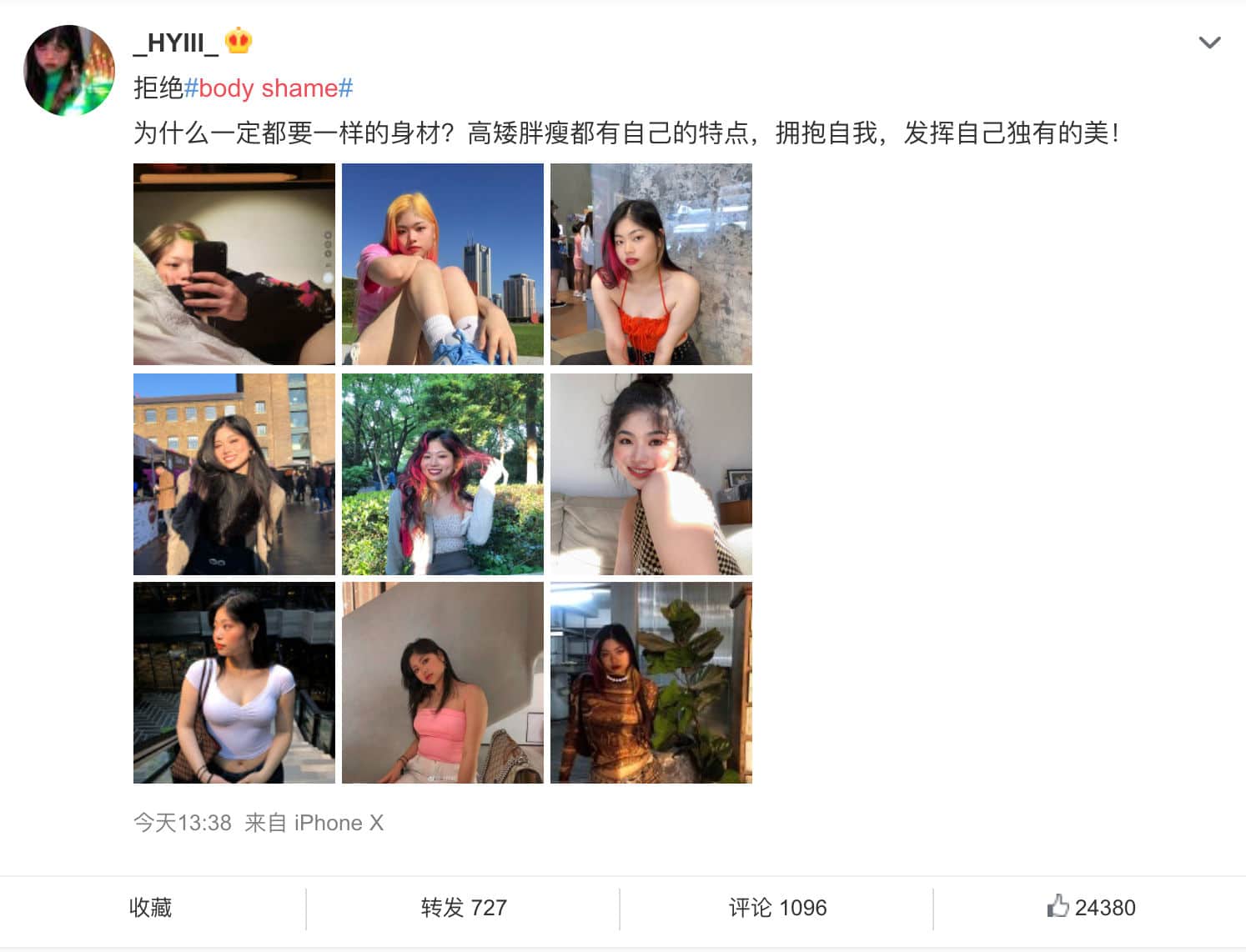First, there was the ‘A4 Waist‘ hype, then there was the ‘iPhone6 Legs‘ trend, the ‘belly button backhand,’ and the online challenge of putting coins in your collarbone to show off how thin you are (锁骨放硬币). Over the past five years, China has seen multiple social media trends that propagated a thin figure as the ruling beauty standard.
But now a different kind of trend is hitting Weibo’s hotlists: one that rejects body shaming and promotes the acceptance of a greater diversity in body sizes and shapes in China.
On August 26, Weibo user @_HYIII_ from Shanghai posted several pictures, writing:
“Reject body shaming! Why should we all have the same figure? Tall or short, thin or fat, all have their own characteristics. Embrace yourself, and show off your own unique beauty!”

The post was soon shared over 900 times, receiving more than 32,000 likes, with the “body shame” phrase soon reaching the top keyword trending list of Sina Weibo.
Gong Li Weight Gain
The body positivity post by ‘_HYIII_’ is going viral on the same day that the apparent weight gain of Chinese actress Gong Li (巩俐) is attracting major attention on Chinese social media platforms such as Weibo and Douyin.
The 54-year-old actress, who is known for starring in famous movies such as Farewell My Concubine, To Live, and Memoirs of a Geisha, was spotted taking a walk with her husband in France on August 24. The photos went viral, with media outlets such as Sina Entertainment noting how Gong Li had become “much rounder” and had put on some “happy fat” (幸福肥).

By now, the hashtag page “Gong Li’s Figure” (#巩俐身材#) has received more than 850 million (!) views on Weibo, with thousands of people commenting on the appearance of the actress. In the comment sections, there were many who lashed out against the focus on Gong Li’s weight gain.
“She just has a regular female body shape. Stop using ‘white / skinny / young’ as the main beauty standard to assess other people,” one commenter said, with another person writing: “Why do you all keep focusing on her figure, did she steal your rice and eat it?!”
“Why do you all keep focusing on her figure, did she steal your rice and eat it?”
Some people suggested that the COVID19 pandemic might have to do with Gong Li’s weight gain, with others writing: “If she is healthy is what matters, skinny or fat is not the way to assess her beauty.”

What stands out from the discussions flooding social media at this time, is that a majority of web users seem to be fed up with the fact that a skinny body is the common standard of women’s beauty in China today – and that accomplished and talented women such as Gong Li are still judged by the size of their waist.
Say No to Body Shaming
In light of the controversy surrounding Gong Li’s recent photos and the following discussions, posts on ‘body shaming’ (身材羞辱) are now flooding Weibo, with many Weibo users calling on people to “reject body shaming” (拒绝#body shame#) and to stop imposing strict beauty standards upon Chinese women.
The pressure to be thin, whether it comes from the media or from others within one’s social circle, is very real and can seriously affect one’s self-esteem. Various studies have found an association between body dissatisfaction and social pressure to be thin and body shaming in Chinese adolescents and young adults (Yan et al 2018).
The main message in this recent Weibo grassroots campaign against body shaming, is that there are many ways in which women can be beautiful and that their beauty should not be merely defined by limited views on the ideal weight, height, or skin color.
Over the past decades, women’s beauty ideals have undergone drastic changes in China, where there has been a traditional preference for “round faces” and “plump bodies.” In today’s society, thin bodies, sharp faces, and a pointy chin are usually regarded as the standard of female ideal beauty (Jung 2018, 68). China’s most popular photo apps, such as Meitu or Pitu, often also include features to make one’s face pointier or one’s legs more skinny.
This is not the first time Weibo sees a growing trend of women opposing strict beauty standards. Although the word ‘body shaming’ has not often been included in previous trends, there have been major trends of women opposing popular skinny challenges and even one social media campaign in which young women showed their hairy armpits to trigger discussions on China’s female aesthetics.
Especially in times of a pandemic, many netizens now stress the importance of health: “Skinny or fat, it really doesn’t matter how much you weigh, as long as you’re healthy – that’s what counts.”
Also read:
- Anorexia in China – Same, But Different
- Binging and Purging as Online Trend: From China’s “Big Stomach Stars” to “Vomit Bars”
- Move Over ‘A4 Waist’, Here Comes the ‘iPhone6 Legs’ Hype – Growing Concerns Over China’s Online Skinny Trends
By Manya Koetse
Follow @WhatsOnWeibo
References
Jung, Jaehee. 2018. “Young Women’s Perceptions of Traditional and Contemporary Female Beauty Ideals in China.” Family and Consumer Sciences Research Journal 47 (1): 56-72.
Yan, Hanyi ; Wu, Yingru ; Oniffrey, Theresa ; Brinkley, Jason ; Zhang, Rui ; Zhang, Xinge ; Wang, Yueqiao ; Chen, Guoxun ; Li, Rui ; Moore, Justin. 2018. “Body Weight Misperception and Its Association with Unhealthy Eating Behaviors among Adolescents in China.” International Journal of Environmental Research and Public Health 15 (5): 936.
Spotted a mistake or want to add something? Please let us know in comments below or email us. First-time commenters, please be patient – we will have to manually approve your comment before it appears.
©2020 Whatsonweibo. All rights reserved. Do not reproduce our content without permission – you can contact us at info@whatsonweibo.com.
The post Chinese Social Media Users Stand up Against Body Shaming appeared first on What's on Weibo.